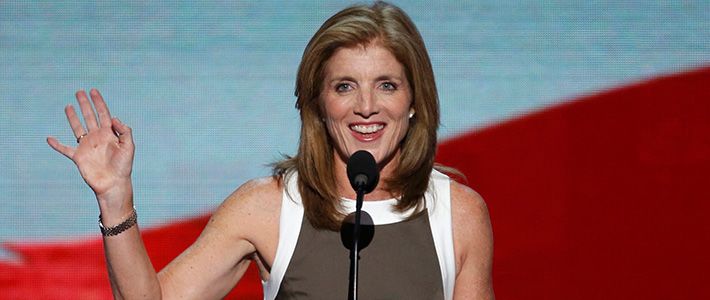
Caroline Kennedy: A Fresh Face at the US Embassy
Politics- English
- 日本語
- 简体字
- 繁體字
- Français
- Español
- العربية
- Русский
On July 24, 2013, President Barack Obama nominated Caroline Kennedy to be the US ambassador to Japan, the only surviving child of the late President John F. Kennedy. She is nominated as the successor to the outgoing ambassador to Japan, John Roos, who left Japan on August 12.
Kennedy’s name had been circulating since around February, with particular interest in her candidacy from the Japanese side. For the past several months, the question on everyone’s lips has been, “What are your thoughts on Ambassador Kennedy?” Indeed, exchanging opinions on this topic after shaking hands has seemed almost de rigueur at meetings between Japanese and US counterparts.
Both Japanese and US media channels broadcast the news when the nomination was announced, telling of how people in both countries remain fascinated with the Kennedy name. While the Japanese are always interested to hear about a new US ambassador to Japan, this must be the first time that a nomination has attracted so much notice in the United States. Approval from the Senate is still pending, but it looks likely that Japan will soon welcome the first female ambassador from the United States.
From Political Heavyweights to Close Friends of the President
Many of the former US ambassadors to Japan have been major political figures. Among them, Mike Mansfield (1977–88) stands out as a politician who was greatly admired and respected in both Japan and his home country. He was the longest-serving Senate majority leader prior to his appointment in Japan, and he used his political clout to keep a lid on the fierce economic tensions that developed between the two nations during his tenure. He is particularly renowned for describing the US-Japan relationship as “the most important bilateral relationship in the world, bar none.” He had a massive presence and symbolized a tightly knit and highly valued US-Japan relationship.
Other notable ambassadors of the past include Walter Mondale (1993–96), who was vice-president during the Jimmy Carter administration; Thomas Foley (1997–2001), who served as speaker of the House of Representatives; and Howard Baker (2001–5), who, like Mansfield, served as majority leader of the Senate. US ambassadors to any nation are highly accomplished individuals; Japan has been blessed with some of the finest.
In recent years, the US side has placed greater emphasis on how close ambassadors are to the president. When Thomas Schieffer (2005–9) became ambassador under President George W. Bush—and indeed during the time of John Roos (August 2009 to August 2013)—it was made clear to the Japanese that the ambassador could arrange a conversation with the president when necessary. Schieffer and Bush were on very close terms, having a history of managing the Texas Rangers baseball club together. Roos was a large-scale donor to the Obama election campaign.
The Role of the Ambassador in Present Times
When it comes to name recognition, Kennedy manages to surpass all of her predecessors. Her political experience, though, is negligible, and in that respect she is not on the same level as some of the major ambassadors of the past. Contrary to people’s expectations, her record to date suggests that she has consciously distanced herself from politics. She was involved in the presidential election campaigns of her uncle, the late Edward (Ted) Kennedy, and Obama, but aside from that she has no history of significant political activity.
Most believe that Kennedy’s appointment was due to the very important role that she played during the Obama campaigns of 2008 and 2012. In particular, the declarations of support made by Caroline Kennedy and Ted Kennedy in the 2008 election were taken to symbolize the Kennedy family passing the baton on to Obama.
Many people are expressing concern over her lack of political and diplomatic experience. While this certainly must be taken into consideration, I think we should be careful to avoid overreacting. In the 1960s, when relations between Japan and the United States were extremely tense, it might have been essential for the US ambassador to be an “old Japan hand” like Edwin Reischauer (1961–66), but Japan-US relations have matured and institutionalized since then. There are multiple channels of dialogue on various issues, and experts from both countries communicate daily to discuss the highly technical matters. Washington will be directly involved in the negotiations on the US-Japan alliance, the Futenma Air Base relocation issue, and the Trans-Pacific Partnership. The ambassador plays a more symbolic role, articulating Washington’s message and delivering it to the Japanese people.
Actively Engaging with the New Ambassador
Instead of expressing concerns over political inexperience, it is probably more appropriate for the Japanese to turn their attention toward making the most of Kennedy’s appointment as ambassador. The US media will almost certainly shine a spotlight on her new position once she takes office, which could be a good opportunity for Japan to appeal to an increasingly disinterested US audience.
As the first female US ambassador to Japan, I hope that Kennedy will actively engage with young women in Japan. This could turn out to be her greatest legacy.
(Originally written in Japanese on July 29, 2013. Photo credit: Reuters/Aflo)
diplomacy United States Barack Obama ambassador Caroline Kennedy US-Japan ties